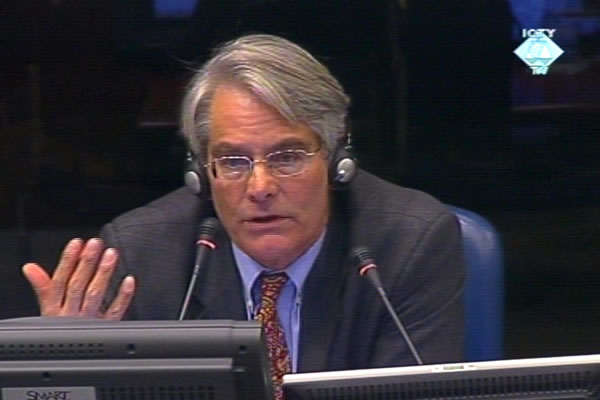Home
WHO HAD THE OBLIGATION TO DEMILITARIZE PROTECTED AREAS
According to Karadzic, the main source of ‘misunderstandings’ between the Serb side and UNPROFOR was the failure of the peace-keepers to comply with their obligation to demilitarize the protected areas. This is why those territories became ‘military strongholds’ of the Muslim troops which used them to attack Serb villages and positions. General Smith’s description of the ‘3K’ sitting across from him in Pale
 Rupert Smith, witness at the Radovan Karadzic trial
Rupert Smith, witness at the Radovan Karadzic trial ‘Can an insane person be held criminally responsible’, former Republika Srpska president Radovan Karadzic asked today as he continued cross-examining British general Rupert Smith. Presiding judge O-Gon Kwon told the witness not to answer the question, prompting Karadzic to reach for General Smith’s book, "The Utility of Force: The Art of War in the Modern World".
Describing his meetings with the Bosnian Serb leaders in Pale in 1995, the UNPROFOR commander in BH wrote, ‘The 3Ks sat across from us: Karadzic, Krajisnik and Koljevic, or the mad, the bad and the loony, the way I saw it’. ‘What do you have to say to that, general, is this how you saw us?’ Karadzic wanted to know.
‘Yes, that is what I thought, and it was in fact a reference to the movie The good, the bad and the ugly’, General Smith retorted. Karadzic asked Smith, ‘how did you see the Muslim side’. Smith said he didn’t remember if he had the same associations about the Bosnian leadership, adding that ‘sometimes they too seemed like creatures that are not of this world’.
In his cross-examination of the British general, Karadzic today tried to prove that UNPROFOR failed to comply with its ‘obligation’ to demilitarize the protected zones under the May 1993 agreement. According to Karadzic, this was the main ‘source of misunderstandings’ between the Serbs and the UN. The Muslim forces in the enclaves secretly armed themselves and used the peace-keepers as a ‘shield’, attacking Serb villages and positions from the protected areas, Karadzic claimed. General Smith didn’t agree with Karadzic that the demilitarization was UNPROFOR’s ‘obligation’. According to General Smith, UNPROFOR acted as a mediator when the two sides reached an agreement on the demilitarization.
Those were the reasons, Karadzic claims, why the Serb forces decided to ‘demilitarize’ the protected areas of Srebrenica and Zepa in the summer of 1995. Karadzic claimed that Mladic and his troops ‘suddenly found themselves in Srebrenica’ on 11 July 1995. The town was empty and this was in line with the view of the Bosnian government that Srebrenica was an unnecessary ‘burden’ and its decision to send the troops from Srebrenica towards Tuzla and evacuate the civilian population in agreement with the UNHCR to the liberated territory, Karadzic said.
Denying the accusations that the Serbs blocked convoys bringing humanitarian aid to the people in the protected areas, Karadzic noted that the Serb forces had to control what was going into the enclaves because those convoys were used for smuggling in weapons and ammunition to the Muslim troops. Karadzic illustrated his claims with images of weapons and ammunition found in the trucks carrying humanitarian aid when they were stopped at Serb checkpoints. Karadzic also denied that the Serb forces made it difficult to supply the peace-keepers in the enclaves. According to Karadzic, they had substantial stockpiles of ammunition, fuel and medicines. General Smith begged to differ.
In Smith’s examination-in chief, the prosecutor quoted from the notorious Directive 7 Karadzic signed in March 1995. The Directive orders that ‘the logistical support for UNPROFOR in the enclaves and the supplies of goods to the Muslim population should be reduced and limited by a planned and inconspicuously restrictive policy of approving requests, thus making them dependent on our good will while at the same time avoiding the censure of the international community’.
In his book Smith described General Ratko Mladic as an ‘arrogant thug’. When a Serb commander complained to Smith at a meeting that he had almost been hit by a NATO bomb, Smith said to him ‘My apologies for missing you’.
General Rupert Smith will be back in The Hague on Tuesday for Karadzic to complete his cross-examination. The trial continues on Monday, 14 February 2011.
Linked Reports
- Case : Karadzic
- 2011-02-10 WAS GENERAL SMITH ‘FASCINATED’ WITH RATKO MLADIC?
- 2011-02-09 MLADIC’S INTENTIONS IN SREBRENICA WERE MISREAD
- 2011-02-08 GENERAL RUPERT SMITH: ‘KARADZIC OUT OF TOUCH WITH WORLD’
- 2011-02-14 EARLY NIGHTFALL IN SARAJEVO
- 2011-02-14 CRISIS STAFFS IN ‘ROUGH AND HARD TIMES’
- 2011-02-15 KARADZIC – VICTIM OF DOUBLE CONSPIRACY
